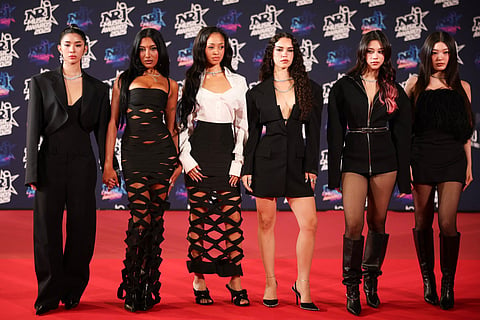Katseye open up about death threats: 'People see us as women to rank'
The ‘gnarly’ and ‘gabriela’ girls have been receiving death threats for a long time

Dubai: Global girl group Katseye are having an incredible year. They've just been nominated for best new artist at the Grammy Awards, their music's racked up millions of streams, and they're being compared to the Spice Girls. But behind the glittering success lies a darker reality: death threats.
"If 1,000 people are sending you death threats, it's jarring," says 20-year-old singer Lara Raj, in an interview with BBC. "Even if it's not going to happen, it's heavy."
The six-piece band haven't just received threats themselves – their families have been targeted too. Raj, who has Tamil Indian heritage, has faced racist abuse and was even falsely reported to immigration authorities. She's since deleted Twitter (X) to protect her mental health.
"I realised I am not the audience for other people's opinions," she explains.
The reality of being in the spotlight
Sadly, Katseye aren't alone. Stars like Chappell Roan and Doja Cat have recently spoken out about harassment from so-called fans. For Katseye, the aggressive behaviour feels particularly gendered.
"People see us as women to rank," says Raj. "They'll grade us based on how pretty we are, our singing skill, dancing skill, and then add it up and give us a percentage. That's so dystopian."
Bandmate Sophia Laforteza acknowledges they signed up for public life, "but it doesn't change the fact that we are human."
From reality TV to global phenomenon
Despite the negativity, Katseye's rise has been remarkable. The group formed on The Debut: Dream Academy, a reality show created by Korean entertainment giant Hybe (the label behind BTS) and America's Geffen Records.
Thousands auditioned, but only 20 made it through to a gruelling two-year training programme of daily dance lessons, vocal practice and tough criticism. The six members – aged between 17 and 22 – hold citizenships across the globe: America, Venezuela, Cuba, Ghana, Italy, Switzerland, China, Singapore, the Philippines and South Korea.
The song that changed everything
Their breakthrough came with 'Gnarly' – a chaotic, two-minute track featuring aggressive beat drops and juddering synths. Critics were divided (one review called it "genuinely atrocious"), but listeners couldn't stop playing it. It's now been streamed over half a billion times.
"When we first heard it, we knew it was going to be shocking," says Daniela Avanzini. "That was so exciting, the idea of making people upset. Not giving them something that's just okay – we were really giving something thrilling."
The gamble paid off. Their second EP, Beautiful Chaos, hit number two in the US charts, and an advert they filmed for Gap went viral with 400 million views.
Strength in diversity
What makes Katseye special isn't just their music – it's their diversity. When Spice Girls' Melanie C hosted a showcase for them in London, she drew parallels between the two groups.
"Something about the Spice Girls was so many people felt they could identify with one of us," she told the audience. "That's so beautiful about your band: you open that door even further for so many people."
Band-member Manon Bannerman agrees: "It's our number one priority to show the girls out there to be proud of where they come from, no matter what they look like."
And despite everything she's faced, Raj has a message for young musicians from diverse backgrounds: "Please do it. You cannot feel held back. Our skin colour, our culture is our power. Use it and own it."
For Katseye, the hate won't stop them from shining.
The writer is a trainee at Gulf News.
Sign up for the Daily Briefing
Get the latest news and updates straight to your inbox







